备考2011高效学习方案英语高二册:unit 1 making a difference
文档属性
| 名称 | 备考2011高效学习方案英语高二册:unit 1 making a difference |
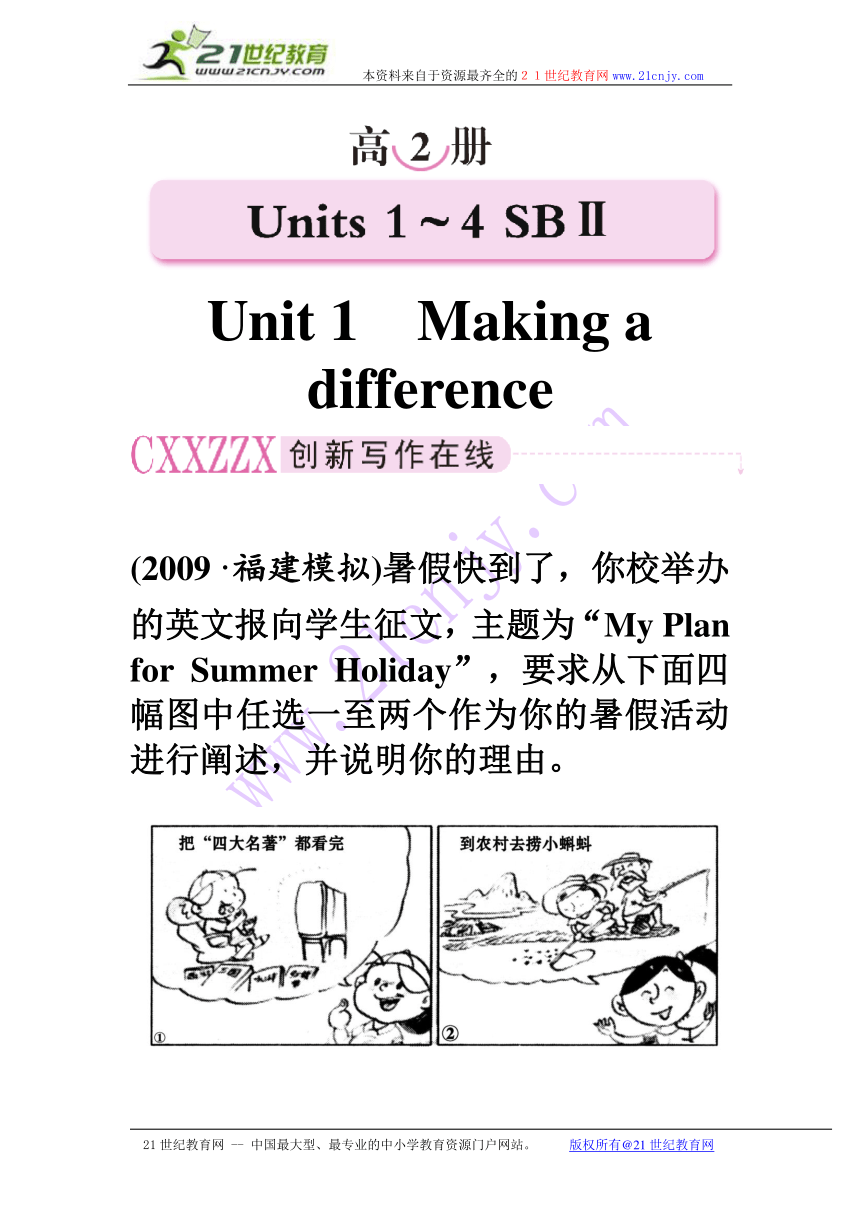
|
|
| 格式 | rar | ||
| 文件大小 | 1.3MB | ||
| 资源类型 | 教案 | ||
| 版本资源 | 人教版 | ||
| 科目 | 英语 | ||
| 更新时间 | 2010-12-14 00:00:00 | ||
图片预览

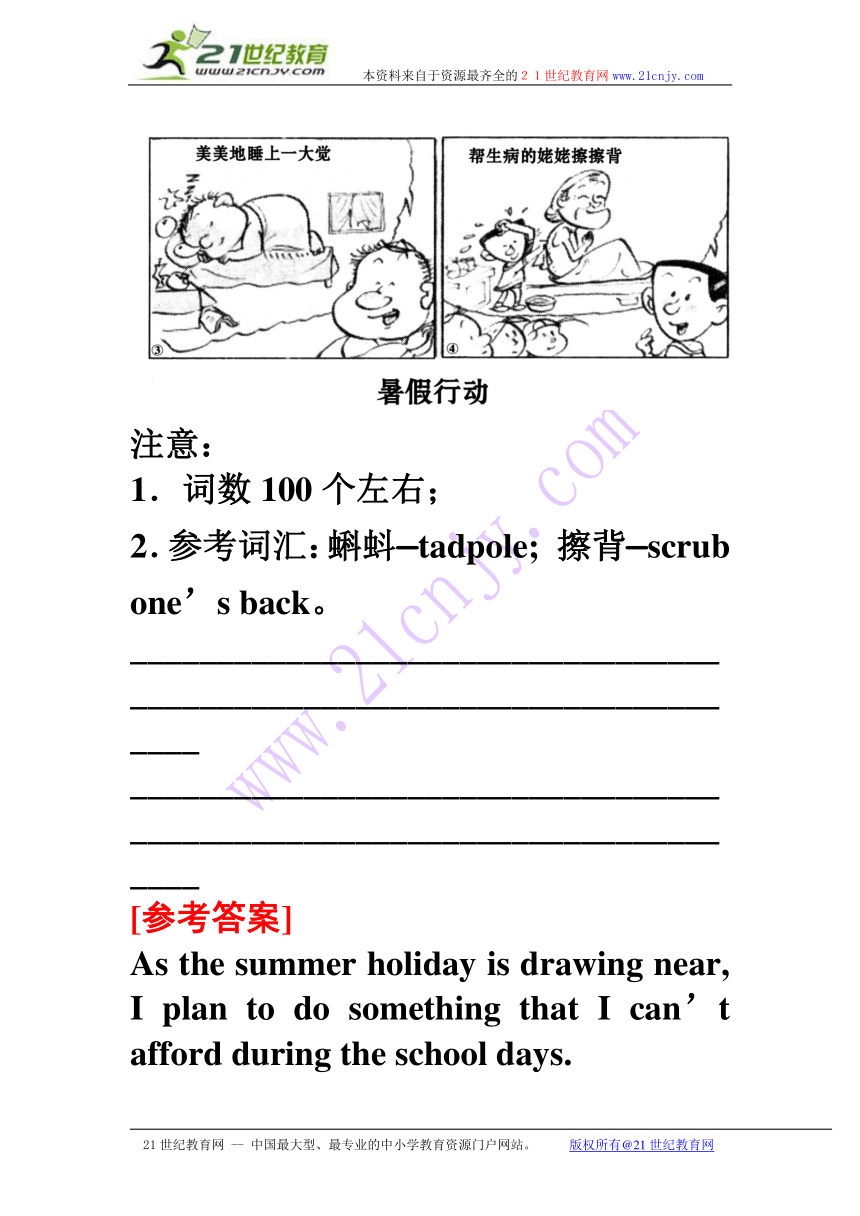
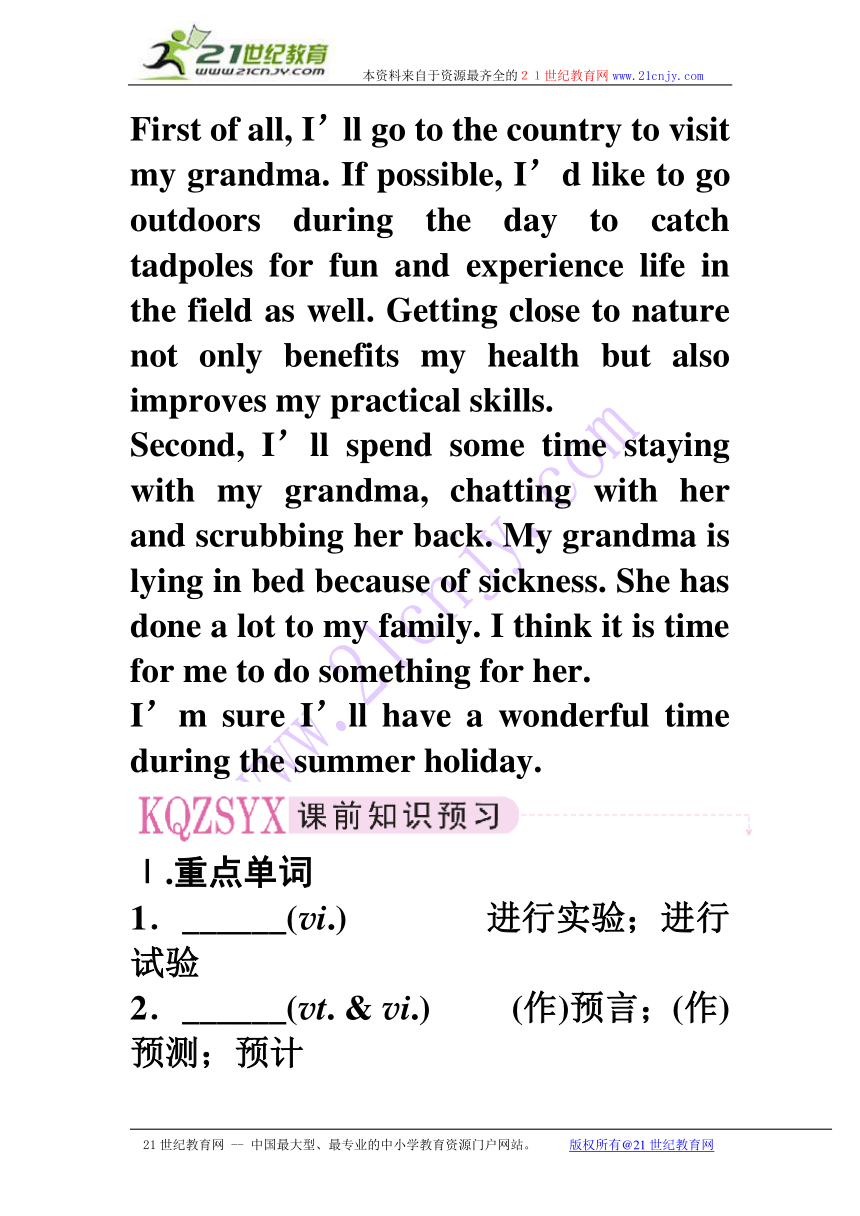
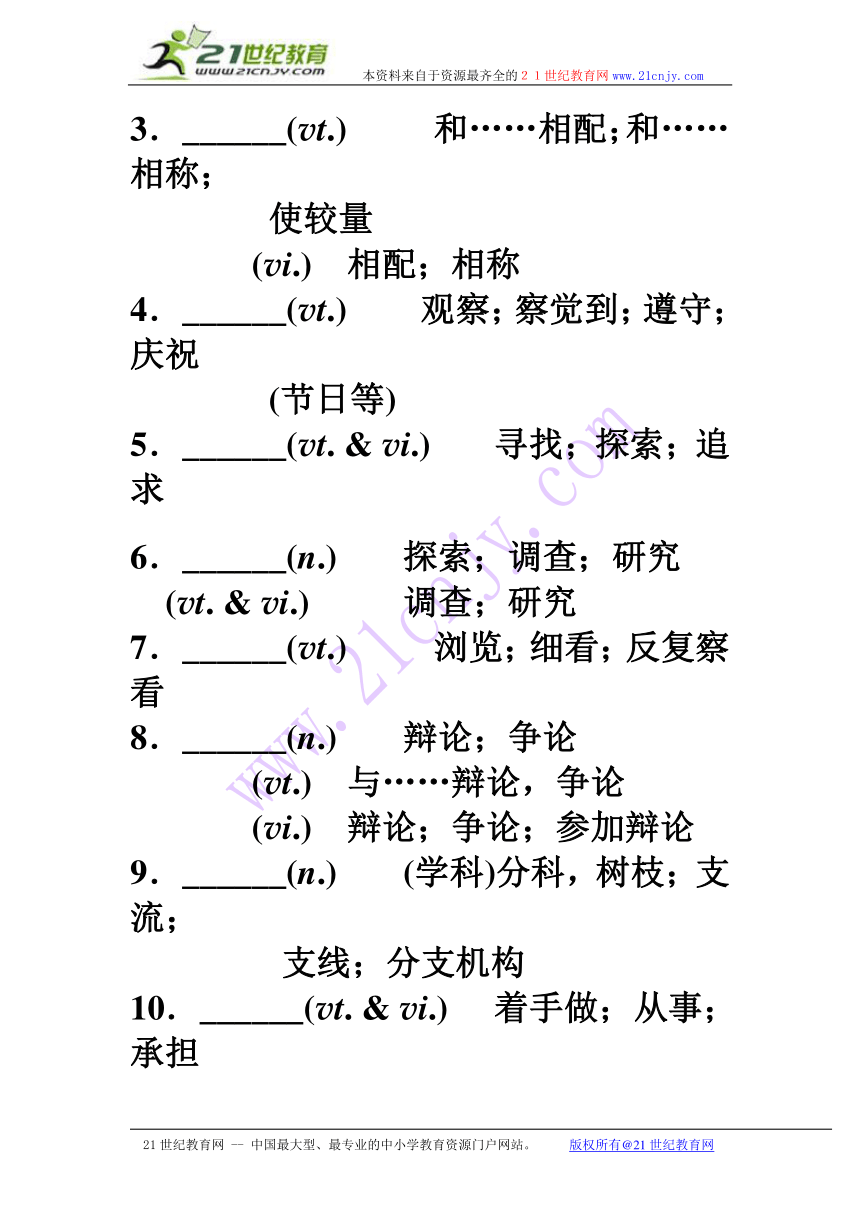
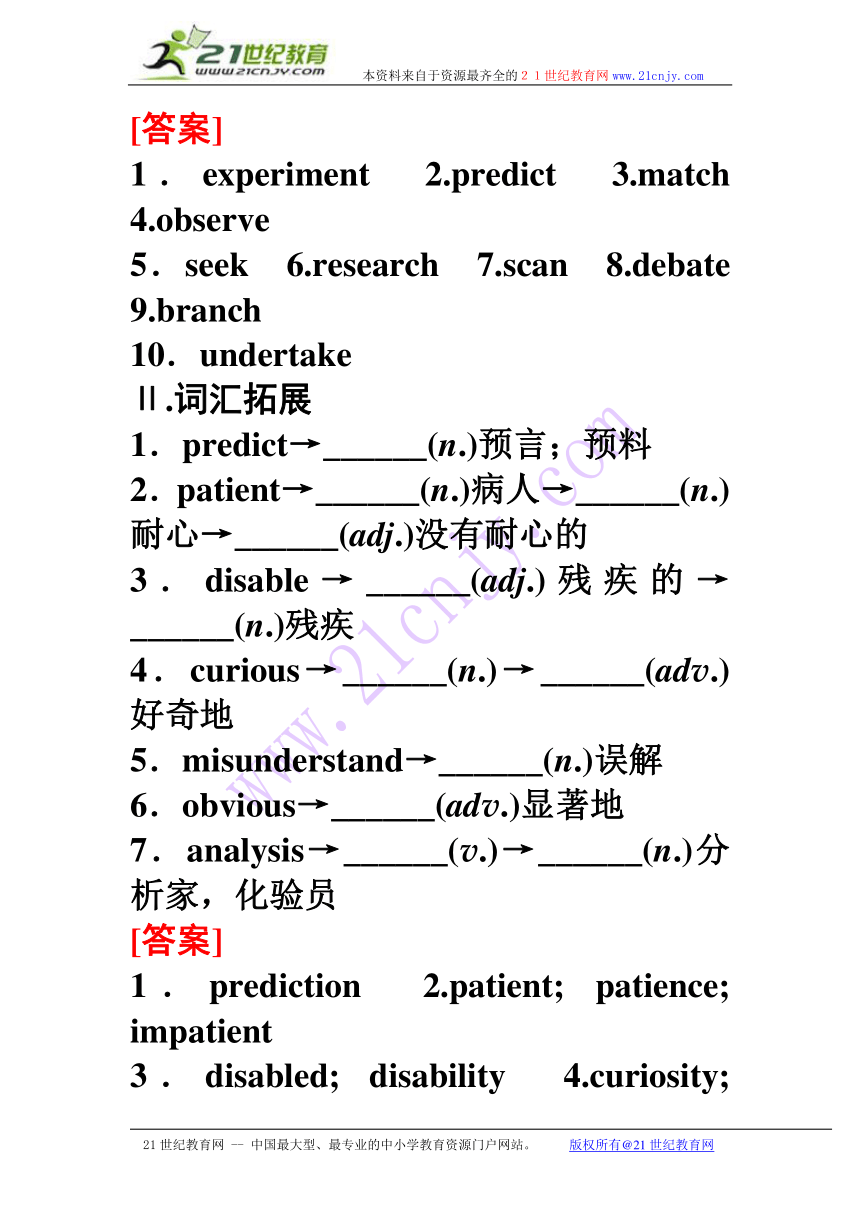
文档简介
本资料来自于资源最齐全的21世纪教育网www.21cnjy.com
Unit 1 Making a difference
(2009·福建模拟)暑假快到了,你校举办的英文报向学生征文,主题为“My Plan for Summer Holiday”,要求从下面四幅图中任选一至两个作为你的暑假活动进行阐述,并说明你的理由。
注意:
1.词数100个左右;
2.参考词汇:蝌蚪—tadpole; 擦背—scrub one’s back。
________________________________________________________________________
________________________________________________________________________
[参考答案]
As the summer holiday is drawing near, I plan to do something that I can’t afford during the school days.
First of all, I’ll go to the country to visit my grandma. If possible, I’d like to go outdoors during the day to catch tadpoles for fun and experience life in the field as well. Getting close to nature not only benefits my health but also improves my practical skills.
Second, I’ll spend some time staying with my grandma, chatting with her and scrubbing her back. My grandma is lying in bed because of sickness. She has done a lot to my family. I think it is time for me to do something for her.
I’m sure I’ll have a wonderful time during the summer holiday.
Ⅰ.重点单词
1.______(vi.) 进行实验;进行试验
2.______(vt. & vi.) (作)预言;(作)预测;预计
3.______(vt.) 和……相配;和……相称;
使较量
(vi.) 相配;相称
4.______(vt.) 观察;察觉到;遵守;庆祝
(节日等)
5.______(vt. & vi.) 寻找;探索;追求
6.______(n.) 探索;调查;研究
(vt. & vi.) 调查;研究
7.______(vt.) 浏览;细看;反复察看
8.______(n.) 辩论;争论
(vt.) 与……辩论,争论
(vi.) 辩论;争论;参加辩论
9.______(n.) (学科)分科,树枝;支流;
支线;分支机构
10.______(vt. & vi.) 着手做;从事;承担
[答案]
1.experiment 2.predict 3.match 4.observe
5.seek 6.research 7.scan 8.debate 9.branch
10.undertake
Ⅱ.词汇拓展
1.predict→______(n.)预言;预料
2.patient→______(n.)病人→______(n.)耐心→______(adj.)没有耐心的
3.disable→______(adj.)残疾的→______(n.)残疾
4.curious→______(n.)→______(adv.)好奇地
5.misunderstand→______(n.)误解
6.obvious→______(adv.)显著地
7.analysis→______(v.)→______(n.)分析家,化验员
[答案]
1.prediction 2.patient; patience; impatient
3.disabled; disability 4.curiosity; curiously
5.misunderstanding 6.obviously 7.analyze; analyst
Ⅲ.重点短语
1.reach one’s ______ 达到/实现某人的目标
2.go ______ 过去,走过
3.be curious ______ 对……感到好奇的,喜欢打
探……的
4.make a ______ 产生影响,很重要
5.the other way ______ 从相反方向;用相反方式
6.be satisfied ______ 对……表示满意或满足
7.use ______ 用完;用尽
8.turn ______ 结果(是),证明(是),原来
(是)
9.dream ______ 梦想,梦到
10.go on ______ 继续某种行为
11.be/get engaged ______ sb. 与某人订婚
12.work ______ 继续工作
[答案]
1.goal 2.by 3.about 4.difference 5.around
6.with 7.up 8.out 9.of 10.with 11.to 12.on
Ⅳ.重点句型
1.There is no point in doing sth.做……没有意义。
2.Nor did he let the disease stop him from living the kind of life he had always dreamt of.
他不会让疾病阻止他过梦想的那种生活。
3....may find it difficult to understand him.
……可能发现很难理解他。
4.What if...?倘若……又怎么办呢?
Ⅴ.重点语法
A description of people(描述人物)
Ⅰ.词汇聚焦
1.seek vt. & vi. 寻找,探索,追求(sought, sought)
[思维拓展]
seek+n./pron. 寻找,探索
seek shelter from the rain找躲雨的地方
seek+to do...企图,试图做……
seek to change my mind试图改变我的主意
seek for/after寻找,追求,探索
seek for a missing pen寻找丢失的钢笔
seek out挑出,挑选,搜寻出(out为副词)
be (much) to seek还(远)没有找到,(大大)缺乏
The reason is_easy_to_seek(容易找).
②They sought_to_kill him(企图杀死他), but he managed to escape.
③We are seeking_for(寻找) a solution to the problem.
Many graduates in China do their best to go abroad to seek their ______.
A. luck B. chance
C. fortune D. fate
解析:本题考查seek固定搭配,seek one’s fortune意为“寻找致富成功之道”。
答案:C
2.research v. 研究,调查,探测,n. 研究,调查
[思维拓展]
research work研究工作;调查工作
carry out a research into调查……;开展调查
do/make a research on对……研究;对……进行调查
research into深入调查
[指点迷津]
research作“研究工作”解时是不可数名词,但有时用researches,不与数词或many连用;指“一个研究项目”时是可数名词。
①They are carrying out a research into the causes of cancer.
②I have often thought of making researches as Darwin did.
Washoe is a young chimpanzee(猩猩). She is no ordinary chimpanzee, though. Scientists are doing a research ______ her.
A. for B. by
C. to D. on
解析:do a research on意思是“对……进行研究”,on后接研究对象。
答案:D
3.engage vt. 使订婚;约定;雇佣;使从事
[思维拓展]
engage sb. to sb.使某人与某人订婚
be engaged to sb.与某人订婚(表状态)
get engaged to sb.与某人订婚(表动作)
engage oneself to do自愿做……
be engaged in sth./in doing sth.忙于(做)某事
①John is engaged to Mary.
②She engaged herself to do the job.
Many students are engaged ______ for their mid-term examinations.
A. to prepare B. to preparing
C. preparing D. in preparing
解析:当表示“忙于做某事”时,应该用be engaged in sth./in doing sth.。
答案:D
4.curious adj. 好奇的,好求知的,爱打听隐私的
[思维拓展]
be curious about sth.对……好奇
be curious to do极想做……
It is curious that...……是奇怪的
curiously adv. 不同寻常地
curiosity n. 好奇心
a curious silence 异乎寻常的沉寂
①Children are naturally curious about everything around them.
②I’m curious to know what is written in his letter.
If you are ______ about Australian cities, just read the book written by Dr Johnson.
A. interested B. anxious
C. upset D. curious
解析:本题考查形容词词义及用法。be interested in“对……感兴趣”;be anxious about“渴望做某事,为……担心/着急”;be upset at“对……感到不安/心烦意乱”;be curious about“对……感到好奇”。
答案:D
5.undertake vt. (undertook, undertaken)着手做,从事,承担
[思维拓展]
undertake+sth.从事某事,承担某事
undertake+to do着手或答应做
undertake+that从句 保证……
①We can undertake the preparation of the room now.
②He undertook the leadership of the team.
③Next he undertook to pay off his debts.
④I’ll undertake that all the cattle shall grow well under my care.
⑤I can’t undertake that you will make a profit.
The Channel Tunnel is one of the biggest engineering projects ever ______.
A. afforded B. undertaken
C. experienced D. affected
解析:A项表示“负担得起,买得起”;B项表示“从事,承担”;C项表示“经历,体验”;D项表示“影响”。题意“海峡隧道是人们所承建的最大工程之一”。
答案:B
6.debate vt. & vi. & n. 与……辩论;争论;参加辩论
[思维拓展]
discuss sth.争论某事
[指点迷津]
debate表示辩论的目的在于说服对方;
argue条理清楚地提出赞成或反对某事的理由;
discuss从不同的观点出发,讨论某事;
quarrel表示争吵
①The question of whether pollution can be got rid of has often been debated.
②After much debate, Harry was chosen captain of the football team.
The two sides debated ______ each other ______ who was the better for a whole day.
A. to; to B. with; about
C. about; with D. between; in
解析:根据debate构成的句式,第一空应该用with表示“与人争论”,第二空应该用about,表示“因某事而争论”。
答案:B
7.match vt. & vi. (使)相配;(使)相称;(使)较量;是……的对手
The curtains don’t match the paint.
No one can match her in tennis.
I’m ready to match my strength with yours.
[指点迷津]
match, suit与fit
match多指大小、色彩、形状、性质等方面的搭配。
suit多指合乎需要、口味、性格、条件、地位等。
fit多指大小合适。
①Does the time suit you
②No dish suits all tastes.
—Your tie looks smart. It ______ with your shirt perfectly.
—Thanks, I’m glad you like it.
A. matches B. meets
C. agrees D. goes
解析:match“与……相配”,及物动词;meet“满足”,及物动词;agree“同意”,与句意不符;go with固定搭配,“与……相配”。
答案:D
8.observe vt. 观察;察觉到;遵守;庆祝
[思维拓展]
observe sth.观察/遵守/庆祝某事
observe sb. do sth.察觉到某人做某事
observe sb. doing sth.察觉到某人在做某事
observe+that-clause察觉到
[指点迷津]
observe与watch
①observe意为“观察”时,相当于watch carefully,尤其用于实验或研究等场合。
②observe意为“察觉到”时,相当于see and watch,而watch意为“盯着看”,相当于keep one’s eyes fixed on。
③watch可表示“观看(比赛、电视、电影等)”,observe无此意义。
④watch还可表示“照料”,也可意为“当心”,observe无此意义。
①The policeman observed the man open the window.
②He observed that it had turned cloudy.
They ______ the train until it disappeared in the distance.
A. saw B. watched
C. noticed D. observed
解析:本题题意为“他们看着火车直到它消失在远方”,A项表示“看到”,强调结果;B项表示“观看”,强调活动中的人或事物;C项强调无意中注意到;D项强调“观察”,用于实验或研究。
答案:B
Ⅱ.短语突破
1.make a difference产生差别,造成影响,起重要作用
[思维拓展]
make no/little/much/some difference(s)
对……没有/几乎没有/有些影响
tell the difference between说出……的差别
be different from与……不同
make a difference between区分……
①It makes a difference which you choose.
②Your support will certainly make a difference in our class.
③It makes no difference to me whether he goes or not.
People in some areas speak English quite ______ the others.
A. different from B. differently from
C. differ from D. difference from
解析:此处的“不同”是修饰speak作状语,因此应选择副词differently。
答案:B
It doesn’t ______ to me whether he’ll attend the meeting.
A. tell the difference B. make no difference
C. make any difference D. differ from
解析:题意为“他是否参加会议对我来讲是无关紧要的”。A项为“说出……的不同”;B项为“无关的,没有什么影响”;C项为“有些影响”;D项为“与……不同”。原句为否定句,故可排除B项。
答案:C
2.go on with继续某事
[思维拓展]
go on with sth.继续做某事(中断一段时间后继续做同一件事)
go on to do sth.接着,继续做(另一件事)
keep doing sth.不停地做某事
keep on doing sth.反复地做某事
continue to do sth.=continue doing sth.=continue with sth.=go on doing sth.继续做某事(同一件事)
After he gave a report about the school, Mr. White ______ the guests around it.
A. went on to show
B. went on showing
C. went on with showing
D. kept on showing
解析:Mr. White做了两件事:一是作了关于学校的报告;二是带领客人参观了学校。也就是说Mr. White继续做了另一件事,所以用go on to do结构。
答案:A
Go on ______ the other exercise after you have finished this one.
A. to do B. doing
C. with D. to be doing
解析:从the other可知是接着做另一件事,要用go on to do,而go on doing强调一直做同一件事;go on with表示在中断之后接着做同一件事。
答案:A
3.turn out结果是,证明是,原来是
[思维拓展]
turn out+adj. 结果是……
turn out+n. 结果是……
turn out to be... 结果是……
turn out that-clause 结果是……
①Though it looked like rain this morning, it has turned out to be fine today.
②The examination turned out to be easy.
③Let’s see how the weather turns out.
We had a good many anxious moments, but everything ______ all right in the end.
A. turned down B. turned up
C. turned out D. turned into
解析:turn down“调小,拒绝”;turn up“露面,调大”;turn into“变成”;turn out all right=turn out (to be) all right意为“结果不错”。
答案:C
To everybody’s surprise, the fashionable young lady ______ to be a thief.
A. found out B. proved out
C. put out D. turned out
解析:turn out固定搭配,“后来证明是……”;“结果是……”;prove也可以作系动词后接不定式to be结构,意为“证明是……”。
答案:D
4.work on继续工作;从事于;影响,起作用;努力说服
[思维拓展]
work out得出,算出;有好结果;制定出;达到……总数
work in插入;加进;把……引进
work at从事于,致力于
work up使激动;逐步建立
work off排除,清理
work over检查
①They’ll work on till sunset.
②He is working on a new novel.
We didn’t plan our art exhibition like that but it ______ very well.
A. worked out B. tried
C. worked on D. carried on
解析:本题题干为“我们没有那样计划我们的艺术展览,但结果却很好。”A项有“结果良好,有效”之意,D项为“继续开展”,B项为“试图,努力”,C项为“起作用,从事于”。
答案:A
5.be satisfied with对……感到满意/满足,v. satisfy使满足,满意
[思维拓展]
satisfy sb.使某人满意
be satisfied to do sth.做某事满意
satisfy sb. of/that...使某人确信……
①I was not satisfied with the result.
②You’ve done well at school. I’m very satisfied with you.
③He was satisfied to win the race.
After moving into the town, my wife did some washing for the rich so that we had just enough to ______ our expenses.
A. serve B. support
C. satisfy D. cover
解析:satisfy vt. 为“满足……的需要,符合……的要求”之意,而support是“支持,维持”之意,一般为support one’s family。其他选项不符合句意。
答案:C
6.go by经过
[思维拓展]
go by sb.从某人旁边经过
go by the law遵守规定
let a chance go by放过机会
Time goes by.时光流逝。
pass by经过;越过;不注意,对……不理会
①Two years went by.
②She let the chance go by.
③Don’t go by that old map, for it might be out of date.
④Life has passed me by.
Two years has ______ before we know it.
A. gone on B. gone by
C. came on D. came by
解析:根据题干,该句应表示“时间流逝”之意,故应用go by。
答案:B
Ⅲ.句型归纳
1.There is no doubt that...毫无疑问……。
[思维拓展]
There’s doubt about sth.
There’s no/little doubt that...
There’s (some) doubt whether...
Sb. has no/little doubt that...
Sb. has (some) doubt whether...
Sb. doubts whether/if...(有时用that)
Sb. doesn’t doubt that...
①Do you have any doubt about his strength He can lift a mountain.
②There’s little doubt that our team will beat yours.
③We don’t doubt that he can do a good job.
What the doctor really doubt is ______ my mother will recover from the serious illness soon.
A. when B. how
C. whether D. why
解析:表语从句部分有soon,因此不用when;从意义上看不表示方式和原因,故排除how和why。
答案:C
2.There did not seem...好像没有……。
[思维拓展]
There be句型的引申形式还有:
There appears (to be)...似乎是……。
There used to be...过去有……。
There is sure to be...肯定是……。
There is said to be...据说有……。
There remains...只剩……。
①There appeared a war between them.
②There used to be a cinema here before the war.
③There’s sure to be someone in the room.
Do you expect ______ to be a possibility that we shall be able to afford the particular furniture we need
A. it B. there
C. that D. one
解析:expect there to be是there be句型的变化,意为“希望有一种可能性……”。
答案:B
3.what if...?倘使……将会怎样?;即使……又有什么要紧?
[思维拓展]
What if aliens invade the earth
What if he gets angry
[注]what if中what可看作是what should sb. do(某人该怎么办)或what does it matter(有什么要紧)或what would happen(将会如何)的省略。
—We’ve decided to invite him to dinner.
—______ he doesn’t come
A. How about B. What about
C. Why not D. What if
解析:意为“他如果不来怎么办?”。A、B均为询问对方看法,与题意不符;C项表示向对方提出建议,且后面直接跟动词原形。
答案:D
4.Nor did he let the disease stop him from living the kind of life he had always dreamt of.他没有让病魔阻止他过上他一直梦想的生活。
表示否定意义的状语或表语等位于句首时,句子通常采用倒装结构。如:
never, nowhere, seldom, in no way, by no means, hardly, little, not until, not only, scarcely, rarely等。
①Never did I dream of seeing him in America.
②The first one wasn’t good, and neither was the second.
③Never before have so many people come to see him.
④Not a single word did she say.
Not a single song ______ at yesterday’s party.
A. she sang B. sang she
C. did she sing D. she did sing
解析:句中需用部分倒装结构,而B项为全部倒装的形式,不符合该种句式的要求。
答案:C
5....and only by discovering what we do best can we hope to reach our goals and truly make a difference.……只有通过发现我们什么干得最好,我们才有希望达到目的并真正成名。
[指点迷津]
只有当only修饰状语且位于句首时才可用倒装,若only修饰名词、代词作主语,都不用倒装结构。如:
①Only you can find out the truth.
当only修饰状语位于句首时,主句用倒装,且为部分倒装结构。如:
②Only a week later did I receive an answer from him.
③Only in recent years have women begun to catch up with men in this area.
______ can you expect to get a pay rise.
A. With hard work
B. Although work hard
C. Only with hard work
D. Now that he works hard
解析:因句子用了倒装结构,所以只有C项符合要求,B项不成立,A、D两项用于句首时,主句不用倒装。
答案:C
Only in this way ______ to make improvement in the operating system.
A. you can hope B. you did hope
C. can you hope D. did you hope
解析:“only+状语”置于句首时,句子要用部分倒装语序,故排除A、B;由句意“只有用这种方式,你才有希望去改进这种操作系统”可知应用can you hope to do...。
答案:C
21世纪教育网 -- 中国最大型、最专业的中小学教育资源门户网站。 版权所有@21世纪教育网
Unit 1 Making a difference
(2009·福建模拟)暑假快到了,你校举办的英文报向学生征文,主题为“My Plan for Summer Holiday”,要求从下面四幅图中任选一至两个作为你的暑假活动进行阐述,并说明你的理由。
注意:
1.词数100个左右;
2.参考词汇:蝌蚪—tadpole; 擦背—scrub one’s back。
________________________________________________________________________
________________________________________________________________________
[参考答案]
As the summer holiday is drawing near, I plan to do something that I can’t afford during the school days.
First of all, I’ll go to the country to visit my grandma. If possible, I’d like to go outdoors during the day to catch tadpoles for fun and experience life in the field as well. Getting close to nature not only benefits my health but also improves my practical skills.
Second, I’ll spend some time staying with my grandma, chatting with her and scrubbing her back. My grandma is lying in bed because of sickness. She has done a lot to my family. I think it is time for me to do something for her.
I’m sure I’ll have a wonderful time during the summer holiday.
Ⅰ.重点单词
1.______(vi.) 进行实验;进行试验
2.______(vt. & vi.) (作)预言;(作)预测;预计
3.______(vt.) 和……相配;和……相称;
使较量
(vi.) 相配;相称
4.______(vt.) 观察;察觉到;遵守;庆祝
(节日等)
5.______(vt. & vi.) 寻找;探索;追求
6.______(n.) 探索;调查;研究
(vt. & vi.) 调查;研究
7.______(vt.) 浏览;细看;反复察看
8.______(n.) 辩论;争论
(vt.) 与……辩论,争论
(vi.) 辩论;争论;参加辩论
9.______(n.) (学科)分科,树枝;支流;
支线;分支机构
10.______(vt. & vi.) 着手做;从事;承担
[答案]
1.experiment 2.predict 3.match 4.observe
5.seek 6.research 7.scan 8.debate 9.branch
10.undertake
Ⅱ.词汇拓展
1.predict→______(n.)预言;预料
2.patient→______(n.)病人→______(n.)耐心→______(adj.)没有耐心的
3.disable→______(adj.)残疾的→______(n.)残疾
4.curious→______(n.)→______(adv.)好奇地
5.misunderstand→______(n.)误解
6.obvious→______(adv.)显著地
7.analysis→______(v.)→______(n.)分析家,化验员
[答案]
1.prediction 2.patient; patience; impatient
3.disabled; disability 4.curiosity; curiously
5.misunderstanding 6.obviously 7.analyze; analyst
Ⅲ.重点短语
1.reach one’s ______ 达到/实现某人的目标
2.go ______ 过去,走过
3.be curious ______ 对……感到好奇的,喜欢打
探……的
4.make a ______ 产生影响,很重要
5.the other way ______ 从相反方向;用相反方式
6.be satisfied ______ 对……表示满意或满足
7.use ______ 用完;用尽
8.turn ______ 结果(是),证明(是),原来
(是)
9.dream ______ 梦想,梦到
10.go on ______ 继续某种行为
11.be/get engaged ______ sb. 与某人订婚
12.work ______ 继续工作
[答案]
1.goal 2.by 3.about 4.difference 5.around
6.with 7.up 8.out 9.of 10.with 11.to 12.on
Ⅳ.重点句型
1.There is no point in doing sth.做……没有意义。
2.Nor did he let the disease stop him from living the kind of life he had always dreamt of.
他不会让疾病阻止他过梦想的那种生活。
3....may find it difficult to understand him.
……可能发现很难理解他。
4.What if...?倘若……又怎么办呢?
Ⅴ.重点语法
A description of people(描述人物)
Ⅰ.词汇聚焦
1.seek vt. & vi. 寻找,探索,追求(sought, sought)
[思维拓展]
seek+n./pron. 寻找,探索
seek shelter from the rain找躲雨的地方
seek+to do...企图,试图做……
seek to change my mind试图改变我的主意
seek for/after寻找,追求,探索
seek for a missing pen寻找丢失的钢笔
seek out挑出,挑选,搜寻出(out为副词)
be (much) to seek还(远)没有找到,(大大)缺乏
The reason is_easy_to_seek(容易找).
②They sought_to_kill him(企图杀死他), but he managed to escape.
③We are seeking_for(寻找) a solution to the problem.
Many graduates in China do their best to go abroad to seek their ______.
A. luck B. chance
C. fortune D. fate
解析:本题考查seek固定搭配,seek one’s fortune意为“寻找致富成功之道”。
答案:C
2.research v. 研究,调查,探测,n. 研究,调查
[思维拓展]
research work研究工作;调查工作
carry out a research into调查……;开展调查
do/make a research on对……研究;对……进行调查
research into深入调查
[指点迷津]
research作“研究工作”解时是不可数名词,但有时用researches,不与数词或many连用;指“一个研究项目”时是可数名词。
①They are carrying out a research into the causes of cancer.
②I have often thought of making researches as Darwin did.
Washoe is a young chimpanzee(猩猩). She is no ordinary chimpanzee, though. Scientists are doing a research ______ her.
A. for B. by
C. to D. on
解析:do a research on意思是“对……进行研究”,on后接研究对象。
答案:D
3.engage vt. 使订婚;约定;雇佣;使从事
[思维拓展]
engage sb. to sb.使某人与某人订婚
be engaged to sb.与某人订婚(表状态)
get engaged to sb.与某人订婚(表动作)
engage oneself to do自愿做……
be engaged in sth./in doing sth.忙于(做)某事
①John is engaged to Mary.
②She engaged herself to do the job.
Many students are engaged ______ for their mid-term examinations.
A. to prepare B. to preparing
C. preparing D. in preparing
解析:当表示“忙于做某事”时,应该用be engaged in sth./in doing sth.。
答案:D
4.curious adj. 好奇的,好求知的,爱打听隐私的
[思维拓展]
be curious about sth.对……好奇
be curious to do极想做……
It is curious that...……是奇怪的
curiously adv. 不同寻常地
curiosity n. 好奇心
a curious silence 异乎寻常的沉寂
①Children are naturally curious about everything around them.
②I’m curious to know what is written in his letter.
If you are ______ about Australian cities, just read the book written by Dr Johnson.
A. interested B. anxious
C. upset D. curious
解析:本题考查形容词词义及用法。be interested in“对……感兴趣”;be anxious about“渴望做某事,为……担心/着急”;be upset at“对……感到不安/心烦意乱”;be curious about“对……感到好奇”。
答案:D
5.undertake vt. (undertook, undertaken)着手做,从事,承担
[思维拓展]
undertake+sth.从事某事,承担某事
undertake+to do着手或答应做
undertake+that从句 保证……
①We can undertake the preparation of the room now.
②He undertook the leadership of the team.
③Next he undertook to pay off his debts.
④I’ll undertake that all the cattle shall grow well under my care.
⑤I can’t undertake that you will make a profit.
The Channel Tunnel is one of the biggest engineering projects ever ______.
A. afforded B. undertaken
C. experienced D. affected
解析:A项表示“负担得起,买得起”;B项表示“从事,承担”;C项表示“经历,体验”;D项表示“影响”。题意“海峡隧道是人们所承建的最大工程之一”。
答案:B
6.debate vt. & vi. & n. 与……辩论;争论;参加辩论
[思维拓展]
discuss sth.争论某事
[指点迷津]
debate表示辩论的目的在于说服对方;
argue条理清楚地提出赞成或反对某事的理由;
discuss从不同的观点出发,讨论某事;
quarrel表示争吵
①The question of whether pollution can be got rid of has often been debated.
②After much debate, Harry was chosen captain of the football team.
The two sides debated ______ each other ______ who was the better for a whole day.
A. to; to B. with; about
C. about; with D. between; in
解析:根据debate构成的句式,第一空应该用with表示“与人争论”,第二空应该用about,表示“因某事而争论”。
答案:B
7.match vt. & vi. (使)相配;(使)相称;(使)较量;是……的对手
The curtains don’t match the paint.
No one can match her in tennis.
I’m ready to match my strength with yours.
[指点迷津]
match, suit与fit
match多指大小、色彩、形状、性质等方面的搭配。
suit多指合乎需要、口味、性格、条件、地位等。
fit多指大小合适。
①Does the time suit you
②No dish suits all tastes.
—Your tie looks smart. It ______ with your shirt perfectly.
—Thanks, I’m glad you like it.
A. matches B. meets
C. agrees D. goes
解析:match“与……相配”,及物动词;meet“满足”,及物动词;agree“同意”,与句意不符;go with固定搭配,“与……相配”。
答案:D
8.observe vt. 观察;察觉到;遵守;庆祝
[思维拓展]
observe sth.观察/遵守/庆祝某事
observe sb. do sth.察觉到某人做某事
observe sb. doing sth.察觉到某人在做某事
observe+that-clause察觉到
[指点迷津]
observe与watch
①observe意为“观察”时,相当于watch carefully,尤其用于实验或研究等场合。
②observe意为“察觉到”时,相当于see and watch,而watch意为“盯着看”,相当于keep one’s eyes fixed on。
③watch可表示“观看(比赛、电视、电影等)”,observe无此意义。
④watch还可表示“照料”,也可意为“当心”,observe无此意义。
①The policeman observed the man open the window.
②He observed that it had turned cloudy.
They ______ the train until it disappeared in the distance.
A. saw B. watched
C. noticed D. observed
解析:本题题意为“他们看着火车直到它消失在远方”,A项表示“看到”,强调结果;B项表示“观看”,强调活动中的人或事物;C项强调无意中注意到;D项强调“观察”,用于实验或研究。
答案:B
Ⅱ.短语突破
1.make a difference产生差别,造成影响,起重要作用
[思维拓展]
make no/little/much/some difference(s)
对……没有/几乎没有/有些影响
tell the difference between说出……的差别
be different from与……不同
make a difference between区分……
①It makes a difference which you choose.
②Your support will certainly make a difference in our class.
③It makes no difference to me whether he goes or not.
People in some areas speak English quite ______ the others.
A. different from B. differently from
C. differ from D. difference from
解析:此处的“不同”是修饰speak作状语,因此应选择副词differently。
答案:B
It doesn’t ______ to me whether he’ll attend the meeting.
A. tell the difference B. make no difference
C. make any difference D. differ from
解析:题意为“他是否参加会议对我来讲是无关紧要的”。A项为“说出……的不同”;B项为“无关的,没有什么影响”;C项为“有些影响”;D项为“与……不同”。原句为否定句,故可排除B项。
答案:C
2.go on with继续某事
[思维拓展]
go on with sth.继续做某事(中断一段时间后继续做同一件事)
go on to do sth.接着,继续做(另一件事)
keep doing sth.不停地做某事
keep on doing sth.反复地做某事
continue to do sth.=continue doing sth.=continue with sth.=go on doing sth.继续做某事(同一件事)
After he gave a report about the school, Mr. White ______ the guests around it.
A. went on to show
B. went on showing
C. went on with showing
D. kept on showing
解析:Mr. White做了两件事:一是作了关于学校的报告;二是带领客人参观了学校。也就是说Mr. White继续做了另一件事,所以用go on to do结构。
答案:A
Go on ______ the other exercise after you have finished this one.
A. to do B. doing
C. with D. to be doing
解析:从the other可知是接着做另一件事,要用go on to do,而go on doing强调一直做同一件事;go on with表示在中断之后接着做同一件事。
答案:A
3.turn out结果是,证明是,原来是
[思维拓展]
turn out+adj. 结果是……
turn out+n. 结果是……
turn out to be... 结果是……
turn out that-clause 结果是……
①Though it looked like rain this morning, it has turned out to be fine today.
②The examination turned out to be easy.
③Let’s see how the weather turns out.
We had a good many anxious moments, but everything ______ all right in the end.
A. turned down B. turned up
C. turned out D. turned into
解析:turn down“调小,拒绝”;turn up“露面,调大”;turn into“变成”;turn out all right=turn out (to be) all right意为“结果不错”。
答案:C
To everybody’s surprise, the fashionable young lady ______ to be a thief.
A. found out B. proved out
C. put out D. turned out
解析:turn out固定搭配,“后来证明是……”;“结果是……”;prove也可以作系动词后接不定式to be结构,意为“证明是……”。
答案:D
4.work on继续工作;从事于;影响,起作用;努力说服
[思维拓展]
work out得出,算出;有好结果;制定出;达到……总数
work in插入;加进;把……引进
work at从事于,致力于
work up使激动;逐步建立
work off排除,清理
work over检查
①They’ll work on till sunset.
②He is working on a new novel.
We didn’t plan our art exhibition like that but it ______ very well.
A. worked out B. tried
C. worked on D. carried on
解析:本题题干为“我们没有那样计划我们的艺术展览,但结果却很好。”A项有“结果良好,有效”之意,D项为“继续开展”,B项为“试图,努力”,C项为“起作用,从事于”。
答案:A
5.be satisfied with对……感到满意/满足,v. satisfy使满足,满意
[思维拓展]
satisfy sb.使某人满意
be satisfied to do sth.做某事满意
satisfy sb. of/that...使某人确信……
①I was not satisfied with the result.
②You’ve done well at school. I’m very satisfied with you.
③He was satisfied to win the race.
After moving into the town, my wife did some washing for the rich so that we had just enough to ______ our expenses.
A. serve B. support
C. satisfy D. cover
解析:satisfy vt. 为“满足……的需要,符合……的要求”之意,而support是“支持,维持”之意,一般为support one’s family。其他选项不符合句意。
答案:C
6.go by经过
[思维拓展]
go by sb.从某人旁边经过
go by the law遵守规定
let a chance go by放过机会
Time goes by.时光流逝。
pass by经过;越过;不注意,对……不理会
①Two years went by.
②She let the chance go by.
③Don’t go by that old map, for it might be out of date.
④Life has passed me by.
Two years has ______ before we know it.
A. gone on B. gone by
C. came on D. came by
解析:根据题干,该句应表示“时间流逝”之意,故应用go by。
答案:B
Ⅲ.句型归纳
1.There is no doubt that...毫无疑问……。
[思维拓展]
There’s doubt about sth.
There’s no/little doubt that...
There’s (some) doubt whether...
Sb. has no/little doubt that...
Sb. has (some) doubt whether...
Sb. doubts whether/if...(有时用that)
Sb. doesn’t doubt that...
①Do you have any doubt about his strength He can lift a mountain.
②There’s little doubt that our team will beat yours.
③We don’t doubt that he can do a good job.
What the doctor really doubt is ______ my mother will recover from the serious illness soon.
A. when B. how
C. whether D. why
解析:表语从句部分有soon,因此不用when;从意义上看不表示方式和原因,故排除how和why。
答案:C
2.There did not seem...好像没有……。
[思维拓展]
There be句型的引申形式还有:
There appears (to be)...似乎是……。
There used to be...过去有……。
There is sure to be...肯定是……。
There is said to be...据说有……。
There remains...只剩……。
①There appeared a war between them.
②There used to be a cinema here before the war.
③There’s sure to be someone in the room.
Do you expect ______ to be a possibility that we shall be able to afford the particular furniture we need
A. it B. there
C. that D. one
解析:expect there to be是there be句型的变化,意为“希望有一种可能性……”。
答案:B
3.what if...?倘使……将会怎样?;即使……又有什么要紧?
[思维拓展]
What if aliens invade the earth
What if he gets angry
[注]what if中what可看作是what should sb. do(某人该怎么办)或what does it matter(有什么要紧)或what would happen(将会如何)的省略。
—We’ve decided to invite him to dinner.
—______ he doesn’t come
A. How about B. What about
C. Why not D. What if
解析:意为“他如果不来怎么办?”。A、B均为询问对方看法,与题意不符;C项表示向对方提出建议,且后面直接跟动词原形。
答案:D
4.Nor did he let the disease stop him from living the kind of life he had always dreamt of.他没有让病魔阻止他过上他一直梦想的生活。
表示否定意义的状语或表语等位于句首时,句子通常采用倒装结构。如:
never, nowhere, seldom, in no way, by no means, hardly, little, not until, not only, scarcely, rarely等。
①Never did I dream of seeing him in America.
②The first one wasn’t good, and neither was the second.
③Never before have so many people come to see him.
④Not a single word did she say.
Not a single song ______ at yesterday’s party.
A. she sang B. sang she
C. did she sing D. she did sing
解析:句中需用部分倒装结构,而B项为全部倒装的形式,不符合该种句式的要求。
答案:C
5....and only by discovering what we do best can we hope to reach our goals and truly make a difference.……只有通过发现我们什么干得最好,我们才有希望达到目的并真正成名。
[指点迷津]
只有当only修饰状语且位于句首时才可用倒装,若only修饰名词、代词作主语,都不用倒装结构。如:
①Only you can find out the truth.
当only修饰状语位于句首时,主句用倒装,且为部分倒装结构。如:
②Only a week later did I receive an answer from him.
③Only in recent years have women begun to catch up with men in this area.
______ can you expect to get a pay rise.
A. With hard work
B. Although work hard
C. Only with hard work
D. Now that he works hard
解析:因句子用了倒装结构,所以只有C项符合要求,B项不成立,A、D两项用于句首时,主句不用倒装。
答案:C
Only in this way ______ to make improvement in the operating system.
A. you can hope B. you did hope
C. can you hope D. did you hope
解析:“only+状语”置于句首时,句子要用部分倒装语序,故排除A、B;由句意“只有用这种方式,你才有希望去改进这种操作系统”可知应用can you hope to do...。
答案:C
21世纪教育网 -- 中国最大型、最专业的中小学教育资源门户网站。 版权所有@21世纪教育网
同课章节目录
